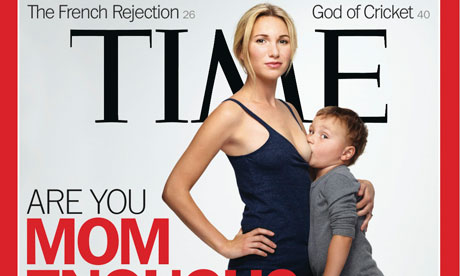
Were you breastfed as a baby and if so, do love or hate your mother? Do you have children of your own and if so, do you or did you breastfeed them? And for how long? And if it was a long time ago, do they still speak to you? And did you ever do anything else with your time apart from devote every waking moment to their wellbeing?
The furore over the recent Time magazine cover in America – a picture of a slim, attractive woman breastfeeding a child who looks big enough to tie his own shoelaces and a headline that screams "Are you mom enough?" – has reawakened those undead questions of modern, if not all, time. I'm all for breastfeeding and happily did it myself, but I respect the right for women to choose not to or to do it for longer. I just wish it wasn't used as a rod to beat us all with.
In a lengthy piece that discusses the fact that the science of attachment is "easily misunderstood and misused" Jamie Lynne Grumet, the "26-year-old mother of two who breastfeeds her three-year-old" is quoted just once before being put on the cover along with her easily identified child. There's also an interview with Bill Sears, the US doctor who wrote the "attachment-parenting bible" in 1992, in which much is made of his Catholic faith, his eight children (he seems to have a few sons-turned-medics working with him)and the difficult childhoods suffered by both him and his wife (missing fathers, mothers either working or suffering mental illness). Among many little snippets is the fact that he and his wife subsidised their sons' wives so they could stay at home.
There are many debates to be had about this story but one is that while women don't breastfeed for lots of different reasons, they don't tend to breastfeed for a long time because they go back to work. The US furore comes just as our own government is planning new laws that aim to make parenting more gender-neutral. It may lack vision and indeed much impact but at least it may be possible. Maybe this time, and maybe just the once, Bette Midler was wrong: when it's seven o'clock in London, it's still 1952 in America.

